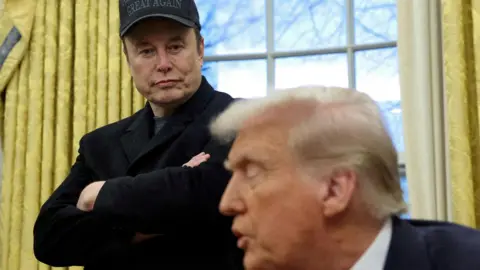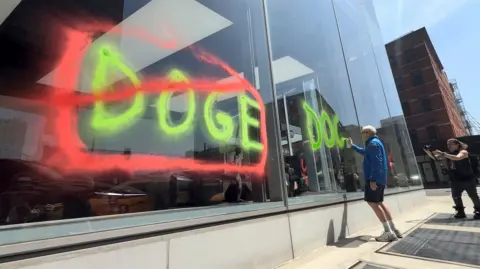Will Elon Musk really leave Doge and what happens when he does?
 Reuters
ReutersTesla CEO Elon Musk has said he will step back from his role with the Trump administration's cost-cutting team known as Doge.
Those at the White House, including the president, have said it has long been the plan that Musk would soon step away, but the news came as the billionaire's car business saw earnings plunge.
Musk's announcement left many unanswered questions, including when he will actually leave the administration and what will happen to Doge, which stands for Department of Government Efficiency.
When asked by the BBC on Wednesday, President Donald Trump reinforced the message that the administration was preparing for Musk's departure.
"We have to, at some point, let him go and do that. We expected to be doing it about this time. I'll talk to Elon about it," Trump said at the White House.
The president also said Tesla will "be taken care of" once Musk returns and alleged that Musk was being "treated very unfairly, I guess, by some of the public".
"He's a great patriot, and [that] should have never happened to him," Trump added.
However, under government rules, spending fewer days at Doge could actually prolong Musk's stint in government.
Musk has been designated a "special government employee" (SGE) – a label that allows him to work at a paid or unpaid government job for 130 days each year.
According to a 2007 Department of Justice memo, cited in an October 2024 guidance document from the Office of Government Ethics, any day on which an SGE performs any work for the government counts as a full day towards that limit.
Measured from Trump's inauguration on 20 January, the 130-day limit - assuming Musk, who brags about working weekends, clocks roughly five days a week at Doge - would run out toward the end of May.
But scaling back would extend that timeframe. Additionally, the 130-day limit would reset in January 2026.
Musk has not given details on his intended schedule. He made the announcement on Tuesday, after Tesla reported financial troubles including a 71% drop in profits.
The drop came after repeated "Tesla takedown" protests across the globe and calls for boycotts against the car manufacturer amid Musk's government role. While organisers have said most protests have been peaceful, some have been destructive with fires set at Tesla showrooms or at charging stations.
- Musk's Tesla facilities in US face 'Takedown' protests
- Trump says anti-Tesla protesters will face 'hell'
- Musk to reduce Doge role after Tesla profits plunge
The company warned investors that the pain could continue, declining to offer a growth forecast while saying "changing political sentiment" could meaningfully hurt demand for the vehicles.
Musk told investors on an earnings call that the time he allocates to Doge "will drop significantly" and that he would be "allocating far more of my time to Tesla".
After the comments, Tesla's languishing stock price rose.
It's also unclear how many days Musk has already worked for the government, whether the government is keeping a tally, and how the limit would be enforced.
There has been criticism that the Trump administration may have flouted government rules in creating Musk's unprecedented role, and concerns that he may not follow the time limit.
Under rules for SGEs, Musk would have to undergo ethics training, provide a confidential financial disclosure statement, and avoid conflicts of interest.
His corporate empire includes large companies that do business with the US government and foreign governments, including SpaceX, which has $22 billion in US government contracts, according to the company's chief executive.
The rules also prohibit special government employees from partisan activities, including wearing clothing with political slogans, while in government offices or carrying out official duties. Musk has been pictured wearing a "Make America Great Again" hat in the Oval Office.
Still, in February, an anonymous White House official told CBS News, the BBC's US partner, that Musk would file a confidential financial disclosure at some point, and had been given an ethics briefing.
 Reuters
ReutersThe following month, White House Press Secretary Karoline Leavitt told the BBC: "Elon Musk is selflessly serving President Trump's administration as a special government employee, and he has abided by all applicable federal laws."
For now, Musk appears to serve at Trump's behest, with no clear oversight other than the president himself.
In a report released last week, progressive think-tank Public Citizen criticised the Trump administration and said the White House was "wildly abusing" the SGE rules.
"Right now, the public has no way to know whether SGEs like Musk who don't file public financial disclosure reports or are permitted to oversee themselves are putting the people's interests ahead of their own," said report author Jon Golinger.
The BBC has contacted Musk and the Office of Personnel Management - the agency overseeing special government employees, and one where Doge employees have reportedly taken over several functions - for comment.
On Thursday, the Wall Street Journal reported that around 100 Doge employees would remain in various government departments after Musk departs this year.
Musk and Trump set a deadline for Doge to finish its work, which corresponds to the 250th anniversary of the signing of the US Declaration of Independence.
The executive order setting up Doge, signed by Trump on Inauguration Day in January, mentioned 4 July 2026 as the ending date.
Earlier, in December, Musk responded to a tweet that also said Doge would finish entirely on that date.
"The final step of DOGE is to delete itself," he wrote.
